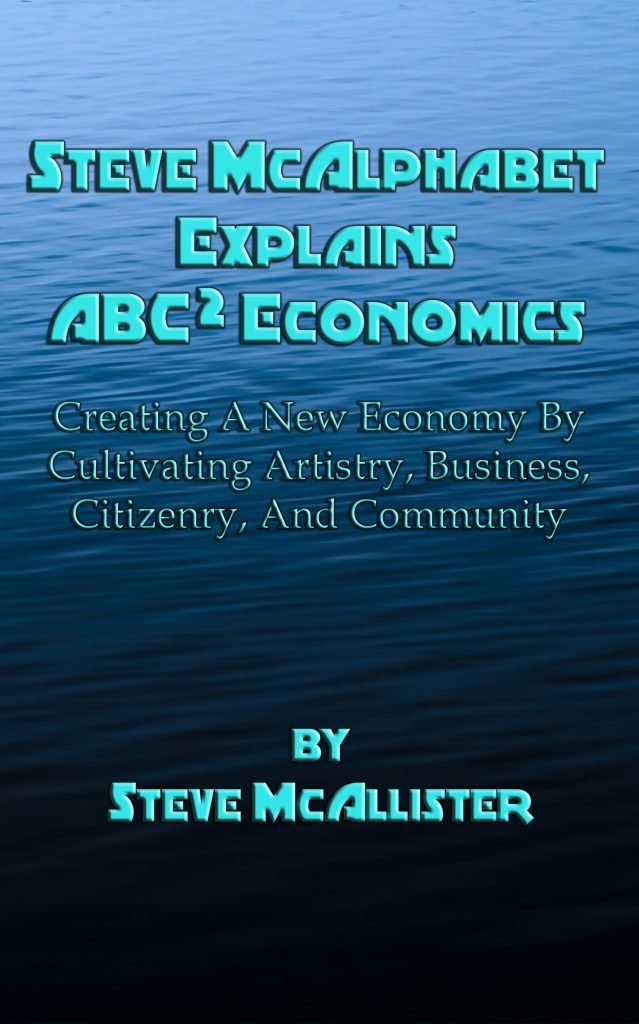“We wasted two hundred years staring at the wrong portrait of ourselves: Homo economicus,” says Kate Raworth in Doughnut Economics, “that solitary figure poised with money in his hand, calculator in his head, nature at his feet, and an insatiable appetite in his heart. It is time to redraw ourselves as people who thrive by connecting with each other and with this living home of ours that is not ours alone.”
It may very well be that we have been offered the technological advances that we have because we are ready to use them. Perhaps human evolution is at the place where it is ready to make a change and redirect its energy from the rampant consumerism that the Market Economy requires to the participatory citizenship the rest of the world needs. The proof, as they say, will be in the pudding.
“Revolution doesn’t happen when society adopts new technologies,” Clay Shirky reminds us in Here Comes Everybody: The Power of Organizing Without Organizations, “it happens when society adopts new behaviors.”
Moving forward, may we recognize that homo sapiens‘ highest purpose is not to make money. We are gifted with so many other capacities and talents that can enrich the Core Economy, tend to the Planetary Economy, and contribute to the Gift Economy. Let us consider how we can empower citizens to participate in each of these facets of our world, rather than continuing to merely enslave them in the marketplace.
“We need to reconceive the idea of a good society in the early twenty-first century and to find a creative path toward it,” says Jeffrey D. Sachs in The Price Of Civilization: Reawakening American Virtue And Prosperity. “Most important, we need to be ready to pay the price of civilization through multiple acts of good citizenship: bearing our fair share of taxes, educating ourselves deeply about society’s needs, acting as vigilant stewards for future generations, and remembering that compassion is the glue that holds society together.”
And for those who have been trained to long for the fast life that capitalism has promised through its commercials and advertisements, promising all of the personal freedom and happiness you can possibly consume, provided you can afford it, a new path forward won’t be as boring as you may think. As a matter of fact, it will be much healthier for both the individual and the collective.
“We don’t think a sustainable society need be stagnant, boring, uniform, or rigid,” Donella H. Meadows, Jorgen Randers, and Dennis Meadows assure us in their 30 year update to The Limits to Growth. “It need not be, and probably could not be, centrally controlled or authoritarian. It could be a world that has the time, the resources, and the will to correct its mistakes, to innovate, to preserve the fertility of its planetary ecosystems. It could focus on mindfully increasing quality of life rather than on mindlessly expanding material consumption and the physical capital stock.”
In his book People, Power, and Profits: Progressive Capitalism for an Age of Discontent, Nobel Prize Winning economist Joseph Stiglitz proclaims, “We as a country can prosper only if there is shared prosperity: this is both an economic reality and an expression of deeply held values. This new social contract should include a commitment that every individual has the opportunity to live up fully to his or her potential, and that every person’s voice is heard in our democracy.”
As we develop a more effective means of creating our economy and empowering one another, and as we reconsider the goals for humanity, we should also consider the goals of each human. Stephen Covey, author of The 7 Habits of Highly Effective People, says that there are four roles of leadership. What if we lead humanity toward cultivating a system that would encourage people to play those roles to the fullest?
Covey says the first role is that of Directing, where we direct our energy, our attention, and our time to create the lives that we lead and impact others around us. We move on to the role of Coaching, sharing and teaching lessons we have learned, alchemizing our passions to truly serve the needs of others. We take on the role of Supporting others, taking care of our people, our planet, and all the life it provides. And finally, through the role of Delegating, we encourage others to carry on our missions and expand our legacy of service.
In order to embrace the greater economy and empower people to find their place in it, we’ll need to be able to sort through our new social arrangements and organize. In his 2008 book Here Comes Everybody, media theorist Clay Shirky suggests a useful hierarchy, ranked by the increasing degree of coordination employed. Groups of people start off simply sharing with a minimum of coordination, and then progress to cooperation, then to collaboration, and finally to collectivism. At each step of this socialism, the amount of additional coordination required enlarges.
Setting up his Agenda For A New Economy, David Korten says, “We can reallocate resources from the military to healthcare and environmental rejuvenation, from automobiles to public transportation, from mining to recycling, from suburban sprawl to compact communities and the reclamation of the forest and agricultural lands, from advertising to education, and from financial speculation to local entrepreneurship – to name just a few immediate priorities. This reallocation is the key to reducing the aggregate human burden on Earth while simultaneously improving health and happiness.”
We have the capacity to not only build and restore trust among one another, but to also encourage the best behaviors and highest ideals. The future is ours to shape. What sort of leadership do we wish to provide?

This is an excerpt from the book Steve McAlphabet Explains ABC Squared Economics. Go to https://stevemc.xyz/books/steve-mcalphabet-explains-abc-squared-economics/ to find out more.


